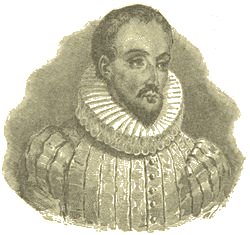Miguel de Cervantes, born on September 29, 1547, in Alcalá de Henares, Spain, is widely regarded as one of the greatest writers in the Spanish language and one of the most important figures in world literature. Best known for his masterpiece Don Quixote, Cervantes' life was as colorful and adventurous as his literary creations.
 Cervantes' early life was marked by instability and hardship. He enlisted as a soldier in 1570 and fought in the Battle of Lepanto, where he sustained injuries that left him maimed in one hand. Despite this, he continued to serve until he was captured by Barbary pirates in 1575. Cervantes spent five years in captivity in Algiers before his family managed to ransom him back to Spain.
Cervantes' early life was marked by instability and hardship. He enlisted as a soldier in 1570 and fought in the Battle of Lepanto, where he sustained injuries that left him maimed in one hand. Despite this, he continued to serve until he was captured by Barbary pirates in 1575. Cervantes spent five years in captivity in Algiers before his family managed to ransom him back to Spain.
Upon his return, Cervantes struggled to achieve financial stability, working various jobs, including as a purchasing agent for the Spanish Armada and a tax collector. Despite these difficulties, he continued to write, producing plays, poetry, and short stories. However, it was the publication of "Don Quixote" in 1605 that solidified his literary legacy.
Don Quixote is a satirical novel that follows the misadventures of the delusional knight-errant Don Quixote and his faithful squire, Sancho Panza. The novel is celebrated for its complex characters, rich humor, and profound insights into human nature. It is often considered the first modern novel due to its narrative innovation and psychological depth.
The success of Don Quixote earned Cervantes widespread acclaim, but it did not bring him significant financial rewards. He continued to write until his death on April 23, 1616, the same date traditionally given for the death of William Shakespeare. Despite his financial struggles, Cervantes' influence on literature is immeasurable. His work has been translated into numerous languages and continues to be studied and cherished worldwide, cementing his status as a literary giant. |
 Cervantes' early life was marked by instability and hardship. He enlisted as a soldier in 1570 and fought in the Battle of Lepanto, where he sustained injuries that left him maimed in one hand. Despite this, he continued to serve until he was captured by Barbary pirates in 1575. Cervantes spent five years in captivity in Algiers before his family managed to ransom him back to Spain.
Cervantes' early life was marked by instability and hardship. He enlisted as a soldier in 1570 and fought in the Battle of Lepanto, where he sustained injuries that left him maimed in one hand. Despite this, he continued to serve until he was captured by Barbary pirates in 1575. Cervantes spent five years in captivity in Algiers before his family managed to ransom him back to Spain.








